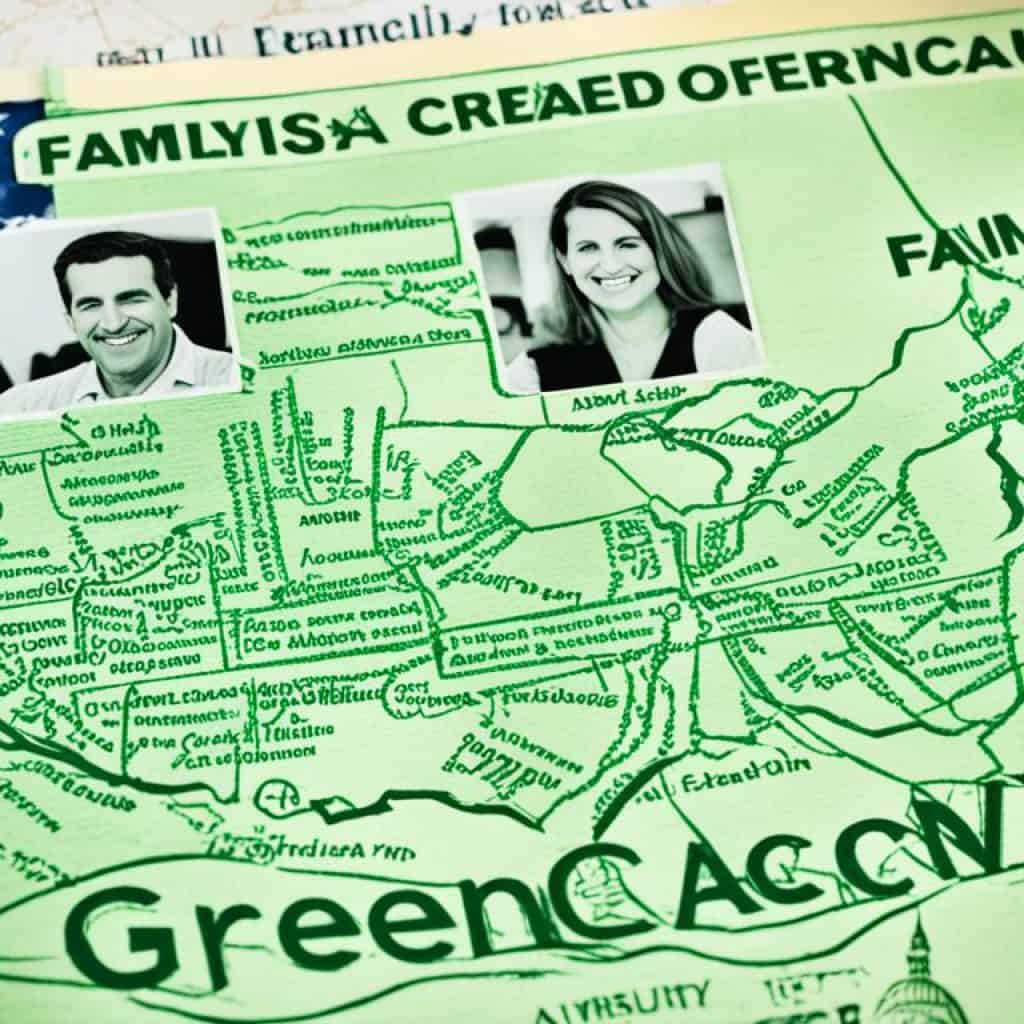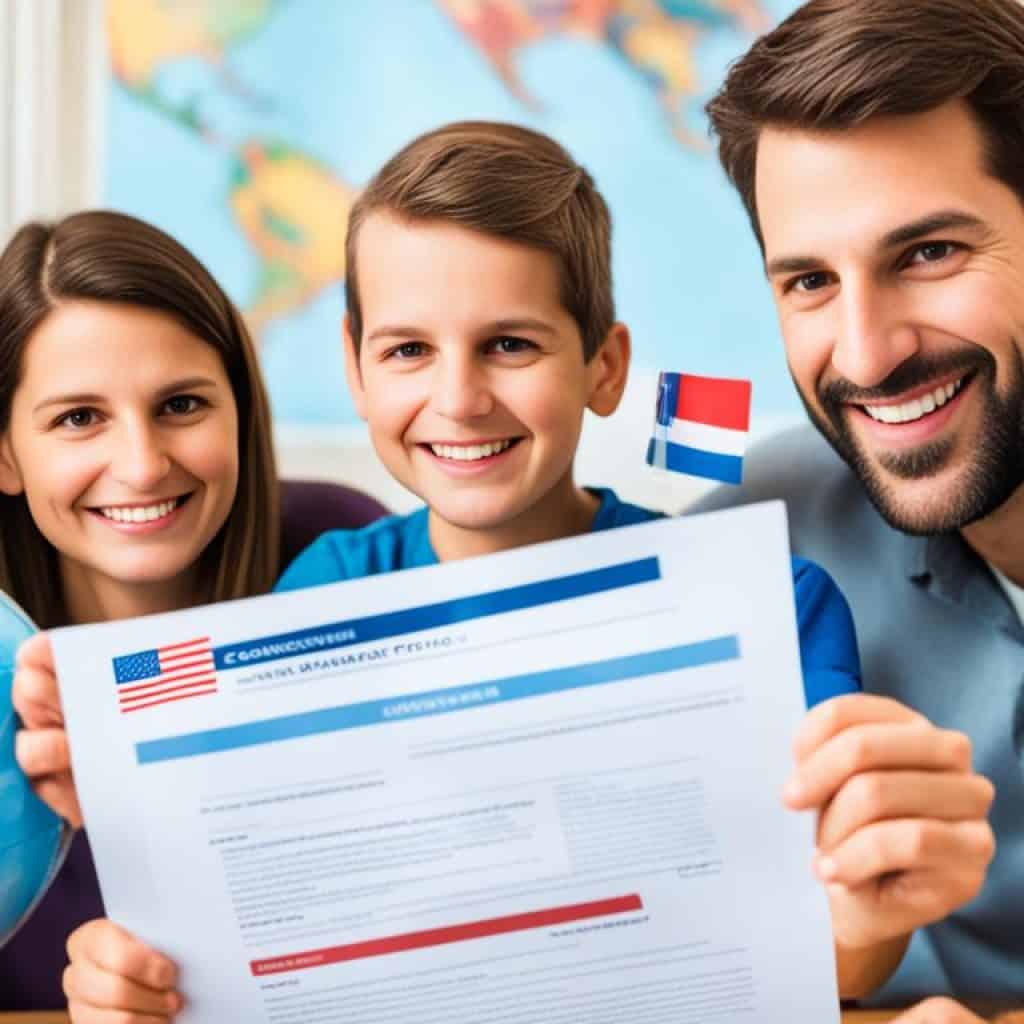Are you a U.S. citizen with family members abroad? Have you ever wondered how you can bring them to the United States and unite your loved ones? The answer lies in securing a Family Visa USA. But what exactly is a Family Visa and how can you obtain one?
Family-based immigration is a pathway that allows U.S. citizens to petition for certain relatives to receive a Green Card, a fiancé(e) visa, or a K-3/K-4 visa. These visas provide opportunities for families to reunite, build a future together, and experience the joys of living in the United States.
In this article, we will explore the types of relatives eligible for these visas, the application process for a Green Card, the preference categories for family members, and the privileges and waiting periods involved. Whether you’re curious about the specific forms required or the complexities of family immigration laws, we’ve got you covered.
Key Takeaways:
- Family Visa USA allows U.S. citizens to petition for certain relatives to receive a Green Card, a fiancé(e) visa, or a K-3/K-4 visa.
- The application process for a Green Card involves filing Form I-130, establishing the family relationship, and, in some cases, filing Form I-485 for adjustment of status.
- Immediate relatives have special privileges and do not need to wait in line for a visa, while other family members are assigned preference categories and may have to wait for visa availability.
- U.S. citizens can also petition for a fiancé(e) visa (K-1) or a K-3/K-4 visa to bring their loved ones to the United States.
- Families can navigate the immigration process by tracking their case progress and staying informed about visa availability.
Relatives for Whom You May Petition
When it comes to Family Visa USA, U.S. citizens have the opportunity to petition for a variety of relatives, allowing families to be reunited and build a future together in the United States. Whether you are a spouse, a parent, or even a sibling, the family-based immigration system provides avenues for loved ones to obtain a Green Card and establish a life in America.
Here are the relatives that U.S. citizens can petition for:
- Spouses
- Unmarried and under 21 children
- Married and/or 21 or over sons and daughters
- Parents (if the petitioner is 21 or over)
- Siblings (if the petitioner is 21 or over)
By extending the opportunity to sponsor these relatives, U.S. citizens can promote family unity and create a strong support network in their new homeland.
Families United Through Family Visa USA
Family-based immigration plays a vital role in ensuring that families can stay together and thrive in the United States. By sponsoring their relatives for a Green Card, U.S. citizens can help create a brighter future for their loved ones, allowing them to live, work, and contribute to the fabric of society. Whether it’s a spouse starting a new career or children pursuing their dreams, family-based immigration opens doors to new opportunities.
“Family is the cornerstone of our society, and our immigration laws recognize the importance of keeping families together. Through family-based immigration, we can build a stronger, more inclusive nation.”
| Relatives | Eligibility |
|---|---|
| Spouses | Must be legally married to the U.S. citizen |
| Unmarried and under 21 children | Must be biologically or legally related to the U.S. citizen |
| Married and/or 21 or over sons and daughters | Must be biologically or legally related to the U.S. citizen |
| Parents (if the petitioner is 21 or over) | Must be biologically or legally related to the U.S. citizen |
| Siblings (if the petitioner is 21 or over) | Must be biologically or legally related to the U.S. citizen |
It’s important for U.S. citizens to understand their rights and responsibilities in petitioning for their relatives. By following the correct procedures and submitting the required documentation, families can successfully navigate the family-based immigration process and achieve their American dream.
Application Process: Green Card (Permanent Residence)
The process of obtaining a Green Card, which grants permanent residence in the United States, begins with the filing of Form I-130, Petition for Alien Relative. This form establishes the family relationship between the petitioner and the relative, laying the foundation for family-based immigration. In some cases, Form I-485, Application to Register Permanent Residence or Adjust Status, can be filed simultaneously with Form I-130, streamlining the process for immediate relatives.
Immediate relatives, such as spouses and unmarried children under 21 years old, have the privilege of submitting Form I-485 along with Form I-130. This allows them to apply for permanent residence without having to wait for visa availability, expediting their journey toward family unity in the United States.
Other family members fall into preference categories and may have to wait for visa availability based on priority dates. The visa availability for these categories depends on the demand and the annual numerical limits set by the U.S. government. While waiting for visa availability, these family members can focus on completing the necessary paperwork and gathering the required supporting documents to ensure a smooth transition once the visa becomes available.
Filing Forms I-130 and I-485
When filing the Form I-130, it is crucial to provide accurate and honest information about the petitioner and the relative being petitioned. The form will require details such as full names, addresses, dates of birth, and other identifying information. It is important to double-check all the information before submission to avoid delays or potential complications in the immigration process. Pay close attention to the guidelines provided in the form instructions to ensure a successful application.
For immediate relatives, filing Form I-485 along with Form I-130 can streamline the process by combining the petition and the application for permanent residence. This means that immediate relatives can submit both forms together, eliminating the need for separate filings and potentially reducing the overall processing time.
“Filing Form I-485 along with Form I-130 allows immediate relatives to concurrently petition and apply for permanent residence, expediting family reunification and ensuring a smoother transition to life in the United States.”
Understanding Preference Categories
Family members who do not qualify as immediate relatives fall into preference categories, each with its own set of waiting periods. The preference categories include:
- Unmarried adult sons and daughters of U.S. citizens
- Spouses and unmarried children under 21 of Green Card holders
- Unmarried adult sons and daughters of Green Card holders
- Married sons and daughters of U.S. citizens
- Brothers and sisters of adult U.S. citizens
The waiting time for visa availability can vary for each category, with some categories experiencing longer wait times than others. This is due to the limited number of visas available each year and the high demand from individuals seeking family-based immigration to the United States.
| Preference Category | Waiting Time |
|---|---|
| Unmarried adult sons and daughters of U.S. citizens | Varies based on visa availability |
| Spouses and unmarried children under 21 of Green Card holders | Varies based on visa availability |
| Unmarried adult sons and daughters of Green Card holders | Varies based on visa availability |
| Married sons and daughters of U.S. citizens | Varies based on visa availability |
| Brothers and sisters of adult U.S. citizens | Varies based on visa availability |
Note: Waiting times for each preference category are subject to change and should be regularly checked on the Visa Bulletin page of the U.S. Department of State website for the most up-to-date information.
During the waiting period, it is important for family members in preference categories to stay informed and maintain accurate contact information with the U.S. Citizenship and Immigration Services (USCIS) to ensure timely communication regarding their immigration status.
By understanding the Green Card application process and the specific requirements for each category, families can navigate the complex immigration system with confidence and work towards reuniting their loved ones in the United States.
Preference Categories for Family Members
Family-based immigration allows for the reunification of families in the United States. While immediate relatives of U.S. citizens can immigrate without facing waiting periods, other family members are assigned preference categories that determine the priority for visa availability. These categories ensure that visas are distributed in an orderly manner, taking into account the familial relationship and the petitioner’s status.
Here are the preference categories for family members:
- Unmarried, adult sons and daughters of U.S. citizens
- Spouses and unmarried children under 21 of Green Card holders
- Unmarried adult sons and daughters of Green Card holders
- Married sons and daughters of U.S. citizens
- Brothers and sisters of adult U.S. citizens
Each category has its own set of criteria and wait times can vary depending on the availability of visas. Let’s take a closer look at each category:
| Preference Category | Criteria |
|---|---|
| Unmarried, adult sons and daughters of U.S. citizens | Must be 21 years of age or older and unmarried |
| Spouses and unmarried children under 21 of Green Card holders | Must be legally married to a Green Card holder or be an unmarried child under 21 |
| Unmarried adult sons and daughters of Green Card holders | Must be 21 years of age or older and unmarried |
| Married sons and daughters of U.S. citizens | Must be legally married to a U.S. citizen |
| Brothers and sisters of adult U.S. citizens | Must be 21 years of age or older and have a sibling who is a U.S. citizen |
Priority Dates and Waiting Times
Visa availability is determined by priority dates, which are assigned when the Form I-130 petition is filed. The priority date establishes the applicant’s place in line for a visa. Wait times can vary greatly depending on the preference category and the demand for visas. It’s important to stay informed about visa bulletin updates to track the progress of the category to which you belong.

Immediate Relatives vs. Other Family Members
When it comes to family-based immigration, there are important distinctions between immediate relatives and other family members. Understanding these differences can help you navigate the process more effectively.
Immediate relatives of U.S. citizens, such as spouses and unmarried children under 21, are given special privileges in the immigration system. Unlike other family members, they are not required to wait in line for a visa. Instead, they can file for a Green Card (Form I-485) at the same time as the petition (Form I-130). This means they can begin the process of obtaining permanent residence without delay, bringing their families together in the United States.
On the other hand, family members in preference categories, such as married sons and daughters of U.S. citizens or siblings of adult U.S. citizens, may have to wait for visa availability based on priority dates and annual numerical limits. The waiting times can vary depending on various factors, including the specific preference category and country of origin.
To illustrate the differences more clearly, let’s compare the privileges of immediate relatives and other family members in a table:
| Immediate Relatives | Other Family Members (Preference Categories) |
|---|---|
| No waiting period for visa availability | May have to wait for visa availability |
| Can file for Green Card (Form I-485) concurrently with the petition (Form I-130) | Must wait for the petition to be approved before filing for a Green Card |
| Spouses, unmarried children under 21, and parents of U.S. citizens | Married sons and daughters of U.S. citizens, siblings of adult U.S. citizens, etc. |
As you can see, immediate relatives have certain advantages that streamline their immigration process. However, it’s important to note that both immediate relatives and other family members have the opportunity to reunite with their loved ones in the United States through family-based immigration.
Family Unity and the Green Card Process
“Uniting families is at the heart of the U.S. immigration system. The Green Card process, including the privileges for immediate relatives, aims to bring families together and provide opportunities for a brighter future.”
By understanding the distinctions between immediate relatives and other family members, you can better navigate the family-based immigration process and work towards reuniting your family in the United States.
Application Process: Fiancé(e) Visa (K-1) and K-3/K-4 Visa
U.S. citizens have the option to petition for their fiancé(e) or spouse and their children to join them in the United States through the application process for a fiancé(e) visa (K-1) or a K-3/K-4 visa. These visas provide opportunities for families to be together while navigating the immigrant visa petition process.
Fiancé(e) Visa (K-1):
A fiancé(e) visa (K-1) allows U.S. citizens to bring their foreign fiancé(e) into the United States for the purpose of getting married within 90 days. This visa offers couples the chance to be together and begin their married lives in the U.S. To apply for a fiancé(e) visa, the U.S. citizen petitioner must submit a Petition for Alien Fiancé(e) (Form I-129F) to the U.S. Citizenship and Immigration Services (USCIS).
K-3/K-4 Visa:
The K-3 visa is designed for U.S. citizens who are married to foreign nationals. This visa allows the foreign-spouse and their children (unmarried and under 21) to enter the United States while their immigrant visa petition (Form I-130) is being processed by the USCIS.
To apply for the K-3 visa, the U.S. citizen petitioner must first file the immigrant visa petition (Form I-130) for their spouse. Once the USCIS approves the petition, the spouse can apply for the K-3 visa at a U.S. embassy or consulate in their home country. The K-4 visa is available for the children of the foreign-spouse.
Benefits of Fiancé(e) Visa (K-1) and K-3/K-4 Visa:
- Allows the fiancé(e) or spouse and their children to join the U.S. citizen petitioner in the United States
- Provides an opportunity for couples to live together and build a future as a family
- Allows the foreign spouse and their children to enter the United States while the immigrant visa petition is being processed
Timeline for Fiancé(e) Visa (K-1) and K-3/K-4 Visa:
| Fiancé(e) Visa (K-1) | K-3/K-4 Visa |
|---|---|
| Approximately 6 to 9 months | Approximately 7 to 12 months |
As with any immigration process, it is recommended to consult with an immigration attorney or accredited representative to ensure a smooth and successful application process for the fiancé(e) visa (K-1) or the K-3/K-4 visa. They can provide guidance, assist with the necessary forms and documentation, and answer any questions that may arise.
Adjustment of Status vs. Consular Processing
When it comes to family immigration to the United States, understanding the different processes available is essential. If your family member is already in the U.S., they can apply for adjustment of status to become a Green Card holder once a visa number becomes available. On the other hand, if your family member is outside of the United States, their petition will be sent to the National Visa Center (NVC) for consular processing.
Adjustment of status allows your family member to change their immigration status while remaining in the United States. This process typically involves submitting the necessary forms and supporting documents to the U.S. Citizenship and Immigration Services (USCIS) for review. If approved, your family member can obtain their Green Card without having to leave the country.
Consular processing, on the other hand, is the method used when the family member is outside of the United States. After the USCIS approves the petition, it is forwarded to the NVC, which facilitates the visa application process at the U.S. embassy or consulate in the family member’s home country. Once the immigrant visa is approved, the family member can travel to the United States and become a Green Card holder.
The preference category of the family member plays a crucial role in determining the waiting time for an immigrant visa number. Immediate relatives, such as spouses, unmarried children under 21, and parents of U.S. citizens, generally have a shorter waiting time, while family members in preference categories may face longer wait times due to annual numerical limits and visa availability.

Understanding the pros and cons of adjustment of status and consular processing is vital to ensure a smooth and efficient immigration process for your family members. Consulting with an experienced immigration attorney can provide the guidance and support necessary to navigate through the complexities of family-based immigration and choose the most suitable path for your specific situation.
Military Members and Family Immigration
Family-based immigration and the process of obtaining a Green Card for family members come with special provisions and benefits for military members and their families. The United States Citizenship and Immigration Services (USCIS) has specific guidelines and resources available to assist military members in understanding the requirements and options within the family immigration process.
For military members who are U.S. citizens, the application process for sponsoring their family members is largely the same as for civilians. However, there are some unique considerations and benefits that apply specifically to military personnel and their families.
Benefits for Military Members and Their Families
Military members and their families may be eligible for expedited processing of their family immigration applications due to their service to the country. This means that their family members may experience faster processing times compared to civilians. Additionally, military members may be able to request specific waivers or exceptions in certain situations, depending on their deployment status or duty assignments.
Furthermore, military members who are stationed overseas or are deployed may be able to take advantage of additional immigration benefits. For example, the military provides a program called Parole in Place, which allows family members who entered the United States without inspection to adjust their status inside the country without having to leave and risk being subject to immigration penalties.
Resources for Military Members
To access comprehensive information and resources tailored specifically to military members regarding family immigration, it is recommended to visit the Military section of the USCIS website. This section provides detailed guidance on the application process, specific benefits available to military members, and answers to frequently asked questions.
Military members and their families can find assistance and support through military legal assistance offices, which often have immigration attorneys available to provide guidance and advice. These offices can help navigate the complexities of the family immigration process and ensure that all necessary forms and documentation are submitted correctly.
Resources and Additional Links
For individuals seeking information on family immigration, there are various resources and additional links available. These valuable resources can provide guidance, answer frequently asked questions, and offer support throughout the immigration process. Whether you’re looking for information on adoption, fiancé(e) visas, citizenship, intercountry adoption, or the overall immigrant visa process, these resources can help you navigate the complexities of family sponsorship in the USA.
U.S. Department of State
The U.S. Department of State is an excellent starting point for individuals interested in family immigration. Their website provides comprehensive information on visa categories, eligibility requirements, and the steps involved in the immigration process. You can find valuable resources such as forms, guides, and instructions to help you understand the procedures and requirements for family sponsorship in the United States.
U.S. Embassies or Consulates
If you require specific guidance or have questions regarding family immigration, contacting a U.S. embassy or consulate can be extremely beneficial. They can provide personalized assistance, answer inquiries related to your specific case, and offer up-to-date information on visa processes and requirements. Make sure to reach out to the appropriate embassy or consulate that serves your region or country of residence.
Legal Assistance
When dealing with the complexities of family immigration, it is often beneficial to seek professional legal assistance. Immigration attorneys or accredited representatives have extensive knowledge and experience in navigating the family sponsorship process. They can guide you through the application process, help you understand the requirements, and ensure that your documentation is accurate and complete. They will also provide valuable advice and support to help you achieve a successful outcome.
Remember, family-sponsored immigration can be a complex process, and staying informed is key to a successful application. Take advantage of the resources available, seek professional guidance when needed, and ensure that you understand the requirements and procedures involved in bringing your loved ones to the United States.
Complexity of Family Immigration Laws
The process of family immigration in the United States can be complicated and challenging to navigate. The laws governing family-based immigration are complex, and they frequently undergo changes due to political, administrative, and resource factors. Understanding the intricacies of these laws is crucial when seeking to bring your loved ones to the United States.
With the various forms, documentation requirements, and eligibility criteria involved, it’s easy to become overwhelmed. That’s why it is highly recommended to seek professional assistance when navigating the family immigration process. Immigration attorneys and experts specialize in this area and can provide invaluable guidance to ensure a smooth and successful immigration journey.
Professional assistance can help you understand the different visa options available for family members, such as the K-1 fiancé(e) visa, K-3/K-4 visa, and Green Card application process. They can also advise you on the specific requirements and documentation needed to establish the familial relationship and increase your chances of approval.
Additionally, an experienced immigration professional can keep you updated on any changes in the law that may affect your case. They have in-depth knowledge of the latest regulations and can help you adapt your strategy accordingly. By working with an expert, you can save time, effort, and potential setbacks throughout the family immigration process.
“Navigating the complex landscape of family immigration laws can be daunting. Seeking professional guidance can give you peace of mind and increase your chances of a successful immigration journey. Let the experts assist you in bringing your loved ones together.”
Remember, the ultimate goal of family-based immigration is to unite families and create a brighter future together in the United States. Don’t let the complexity of the process deter you from pursuing your dreams of reuniting with your loved ones. Seek professional assistance and embark on this journey with confidence and peace of mind.
Benefits of Professional Assistance in Family Immigration
| Benefits | Explanation |
|---|---|
| Expert Knowledge | Immigration professionals have extensive knowledge of family immigration laws, ensuring accurate and up-to-date guidance. |
| Document Preparation | Professionals can assist in gathering the necessary documents, preparing petitions, and ensuring all required information is included. |
| Legal Strategy | An immigration attorney can develop a personalized legal strategy tailored to your specific circumstances, increasing your chances of success. |
| Case Monitoring | Professionals can monitor the progress of your case, ensuring timely submission, and provide updates on any changes or requirements. |
| Simplified Process | By working with an expert, you can streamline the family immigration process, minimize errors, and avoid potential delays or denials. |
With the complexity of family immigration laws, it is essential to have the right support and guidance throughout the process. Seek the assistance of professionals who can help navigate the intricate legal requirements, maximize your chances of success, and ensure a smooth transition for your loved ones.
Importance of Family Unity in U.S. Immigration Law
In U.S. immigration law, family unity is considered a fundamental principle. Recognizing the significance of reuniting families, Congress has established special provisions and benefits for family-based immigration. The goal is to enable families to come together and build a future in the United States.
Family-based immigration, also known as US family immigration or family sponsorship USA, plays a crucial role in keeping families connected and ensuring their well-being. It allows U.S. citizens and lawful permanent residents (Green Card holders) to petition for certain family members to join them in the United States.
By emphasizing family unity, the U.S. immigration system acknowledges the vital role that families play in supporting each other and contributing to the nation’s success. The ability to live in the same country not only strengthens familial bonds but also provides opportunities for education, career growth, and a better quality of life.
Through family-based immigration, individuals have the chance to be reunited with their spouses, children, parents, and siblings, fostering a sense of belonging and stability. Family ties are nurtured, cultural traditions are shared, and generations can thrive together, creating a vibrant tapestry of diverse backgrounds and experiences.
Moreover, studies have shown that family unity contributes to positive social and economic outcomes, benefiting both individuals and society as a whole. It strengthens social networks, promotes emotional well-being, and enhances community engagement. Additionally, family-based immigrants often bring unique skills, talents, and perspectives that enrich the workforce and contribute to innovation and growth.
Family immigration continues to be an integral part of the U.S. immigration landscape, reflecting the country’s commitment to humanitarian values and the recognition of the power of family bonds. It enables families to overcome geographical barriers and build a brighter future together in the United States.
âThe love of family and the admiration of friends are much more important than wealth and privilege.â – Charles Kuralt

Key Takeaways:
- Family unity is a cornerstone of U.S. immigration law, with special provisions and benefits for family-based immigration.
- US family immigration, also known as family sponsorship USA, plays a crucial role in enabling families to build a future together in the United States.
- Family-based immigration strengthens familial bonds, enhances cultural sharing, and contributes to positive social and economic outcomes.
- Reuniting families through immigration fosters a sense of belonging, stability, and well-being for individuals and society as a whole.
- Family-based immigrants bring diverse skills, talents, and perspectives that enrich the workforce and promote innovation and growth.
Privileges for Immediate Relatives
Immediate relatives of U.S. citizens are granted special privileges in the immigration system. They are not subject to waiting periods and can immediately immigrate to the United States. These privileges apply to spouses, unmarried and under 21 children, and parents of U.S. citizens.
Immediate relatives have the opportunity to reunite with their loved ones in the United States without delay. This ensures that families can begin building a future together as soon as possible.
The special privileges granted to immediate relatives reflect the importance of family unity in U.S. immigration law. Recognizing the significance of keeping families together, the immigration system allows for expedited immigration for immediate relatives.
Eligible Immediate Relatives
The immediate relatives eligible for these immigration privileges include:
- Spouses: The husband or wife of a U.S. citizen.
- Unmarried and under 21 children: The children of a U.S. citizen who are not married and are under the age of 21.
- Parents: The parents of a U.S. citizen, provided that the citizen is 21 years of age or older.
These immediate relatives can apply for a Green Card (permanent residence) without waiting for visa availability or priority dates. This privilege allows them to establish their new lives in the United States expeditiously.
By prioritizing immediate family members, the U.S. immigration system aims to facilitate the seamless integration of loved ones into American society, fostering stronger bonds and a brighter future for families.
| Immediate Relatives | Benefits |
|---|---|
| Spouses | No waiting period; immediate immigration |
| Unmarried and under 21 children | No waiting period; immediate immigration |
| Parents (petitioner must be 21 or older) | No waiting period; immediate immigration |
Waiting Periods and Preference Categories
When petitioning for a Family Visa USA or seeking a Green Card for family members, it’s important to understand the waiting periods and preference categories that may affect the process. Visa availability is determined by priority dates and per-country numerical limits, which can result in varying waiting periods for different categories of family members.
Preference Categories
In the family immigration system, family members are assigned preference categories based on their relationship to the petitioner. These categories determine the priority for visa availability. Let’s take a closer look at the different preference categories:
| Preference Category | Description |
|---|---|
| First Preference | Unmarried, adult sons and daughters of U.S. citizens |
| Second Preference | Spouses and unmarried children under 21 of Green Card holders |
| Third Preference | Unmarried adult sons and daughters of Green Card holders |
| Fourth Preference | Married sons and daughters of U.S. citizens |
| Fifth Preference | Brothers and sisters of adult U.S. citizens |
Waiting Periods
The waiting periods for family members in preference categories can vary depending on the category and the number of visas available each year. Some categories may have a longer waiting period due to higher demand or per-country limits. It’s important to note that immediate relatives of U.S. citizens, such as spouses and unmarried children under 21, are not subject to waiting periods and can immediately apply for a Green Card.
My Case Progress and Visa Availability
Once you have filed your petition for a Family Visa USA, it is essential to keep track of the progress and visa availability. Staying informed will help you plan and prepare for the next steps in the immigration process.
The U.S. Department of State provides a convenient way to monitor your case progress through the My Case Status page. By entering your case number, you can access up-to-date information on the status of your petition. This allows you to stay informed and be proactive in your immigration journey.
Additionally, the Visa Bulletin page on the U.S. Department of State website provides vital information on visa availability and priority dates. The Visa Bulletin outlines the cut-off dates for each preference category, indicating when visas are available for family members in those categories. Keeping an eye on the Visa Bulletin will help you gauge when your relative’s visa may become available.
Being aware of your case progress and visa availability ensures that you are prepared and ready to take the necessary steps when the time comes. Stay informed and make the most of this valuable information to unite your family through the Family Visa USA.
“Staying informed about the progress of your case and visa availability allows you to navigate the immigration process with confidence and peace of mind.”
Visa Availability Categories
| Preference Category | Waiting Period |
|---|---|
| Immediate Relatives (Spouses, unmarried children under 21, parents of U.S. citizens) | No waiting period |
| F1 – Unmarried Sons and Daughters of U.S. Citizens | Varies based on visa availability |
| F2A – Spouses and Unmarried Children (Under 21) of Green Card Holders | Varies based on visa availability |
| F2B – Unmarried Sons and Daughters (21 and over) of Green Card Holders | Varies based on visa availability |
| F3 – Married Sons and Daughters of U.S. Citizens | Varies based on visa availability |
| F4 – Brothers and Sisters of Adult U.S. Citizens | Varies based on visa availability |
Understanding the waiting periods and visa availability in each preference category is crucial for planning and managing expectations during the immigration process. Consult the Visa Bulletin regularly and prepare yourself for the upcoming steps in your family’s immigration journey.
Conclusion
The Family Visa USA offers a pathway for U.S. citizens to bring their loved ones together and create a future in the United States. By petitioning for their family members and navigating the application process, families can embark on a journey of reunification. It is essential to understand the complexities of immigration laws, including the privileges granted to immediate relatives and the waiting periods for preference categories.
Planning and preparation are key to a successful immigration process. To ensure a smooth journey, it is advisable to seek professional assistance from immigration experts who can provide guidance and support. They have the knowledge and experience to navigate the intricacies of the system and help families understand their rights and responsibilities.
Bringing families together and nurturing their unity is a fundamental aspect of U.S. immigration law. Through the Family Visa USA and the opportunity to obtain a Green Card, families can build a brighter future and contribute to their community in the United States. Embrace this opportunity, stay informed, and seek the resources and guidance available to make your family’s immigration dreams a reality.
FAQ
Who can I petition for a Family Visa USA?
You can petition for various relatives, including spouses, unmarried and under 21 children, married and/or 21 or over sons and daughters, parents, and siblings.
What is the application process for a Green Card?
The application process for a Green Card starts with filing Form I-130, Petition for Alien Relative. In some cases, it can be filed together with Form I-485, Application to Register Permanent Residence or Adjust Status.
What are the preference categories for family members?
The preference categories include unmarried, adult sons and daughters of U.S. citizens; spouses and unmarried children under 21 of Green Card holders; unmarried adult sons and daughters of Green Card holders; married sons and daughters of U.S. citizens; and brothers and sisters of adult U.S. citizens.
What is the difference between immediate relatives and other family members?
Immediate relatives, such as spouses and unmarried children under 21, have special privileges and do not need to wait in line for a visa. Other family members are subject to preference categories and may have to wait for visa availability based on priority dates.
Can I petition for a fiancé(e) visa?
Yes, U.S. citizens can petition for a fiancé(e) residing outside the United States to receive a fiancé(e) visa (K-1).
What is the difference between adjustment of status and consular processing?
If the family member is already in the United States, they can apply for adjustment of status to become a Green Card holder. If the family member is outside the United States, the petition will be processed through consular processing.
Are there specific provisions for military members and their families?
Yes, there are specific provisions and benefits available to military members and their families within the family immigration process. Refer to the Military section of the USCIS website for more information.
What resources are available for family immigration?
Various resources and additional links are available for individuals seeking information on family immigration, including adoption, fiancé(e) visas, citizenship, intercountry adoption, and the immigrant visa process.
Are family immigration laws complex?
Yes, family immigration laws in the United States are complex and can be difficult to navigate. It is important to understand the complexities and seek professional assistance when navigating the family immigration process.
Why is family unity important in U.S. immigration law?
Family unity is considered a fundamental aspect of U.S. immigration law. Congress recognizes the importance of reuniting families and has created special provisions and benefits for family-based immigration.
What privileges do immediate relatives have?
Immediate relatives of U.S. citizens, such as spouses, unmarried and under 21 children, and parents, are granted special privileges in the immigration system. They are not subject to waiting periods and can immediately immigrate to the United States.
Are there waiting periods for family members in preference categories?
Yes, family members in preference categories may have to wait for visa availability based on priority dates and per-country numerical limits. The waiting periods can vary.
How can I track the progress of my case and visa availability?
You can track the progress of your case through the My Case Status page. The Visa Bulletin page on the U.S. Department of State website provides information on visa availability and priority dates.








Add comment